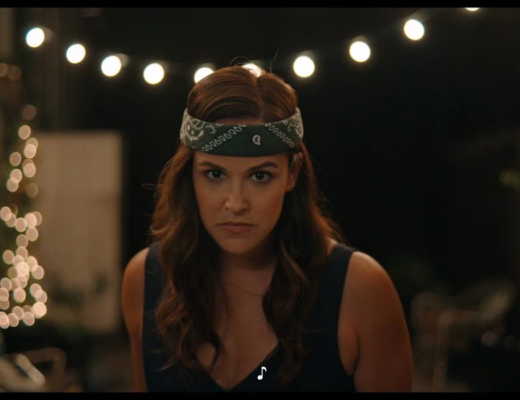At first blush (and the next few, for that matter), actress Brittany Snow’s directorial debut, Parachute, which premiered in the Narrative Feature Competition at the 2023 SXSW Film Festival, seems lab-created for a certain other, Park City-set fest. It’s a drama cut through with some messy romance and a twinge of darkness, is peppered with recognizable Hollywood faces in mostly thankless supporting roles, trades in the subject matter of mental health, and is goosed by plenty of screenplay quirks (Kid Cudi shows up to sing karaoke and wear a series of dad-approved button-ups; cinema’s greatest cheat code Dave Bautista runs a muder-mystery dinner theater; the adult romantic leads almost immediately build a blanket fort). Then there’s the plot: Riley (Courtney Eaton) and Ethan (Thomas Mann) meet under less than ideal circumstances. He has just gotten out of jail after a night of drunken tomfoolery that involved a flaming bottle of Fireball and broken up with his girlfriend; she has just been discharged from rehab for reasons she initially remains vague about — but which we later learn is a cocktail of body dysmorphia, an eating disorder, fear of abandonment, and an obsessive personality, which the official synopsis refers to as love addiction — and has committed to a year of singledom. Despite the shambled nature of their meet cute, however, they immediately click. But soon Riley’s interior tempest returns, and their relationship (sort of platonic in its sexlessness, but mostly not) begins to deteriorate.
If that all sounds fairly gauche in description, the experience of Parachute never dips below innocuous in even its worst moments — mostly when Snow and co-writer Becca Gleason invoke the indie film template for filler and temporarily disavow nuance, such as when Riley’s rich, unempathetic mother shows up to castigate her daughter’s lifestyle, deny her very real mental health struggles, and bandy a few passive-aggresions about her (very healthy) weight. The script then asks Ethan to verbally indict the bad parenting and lingering trauma it caused, ill- advisedly even suggesting a possible origin for Riley’s pathology. Plenty of these sins are covered, however, thanks to Eaton’s anchoring, viscerally pained turn (which won SXSW’s Special Jury Award for performance). She is both physically and emotionally raw in Parachute, often occupying the space where intimacy bleeds into obsession, and equally as adept at communicating Riley’s cracked-glass fragility as she is at channeling the character’s anguish and self-loathing into vitriolic lashing-outs. Eaton understands how tenderness is flayed from this young woman in even seemingly run-of-the-mill interactions, and the emotional disintegration becomes palpably more brutal as the film moves forward.
Snow deserves much of the credit for the film’s successes as well. As a director, she doesn’t bring much formal swagger to the table — inserting a few indie rock-set photo montages as interstitial fodder is about as flexing as the movie gets visually — but she does imbue the proceedings with a level of specificity that enriches the material. Snow has been open about her own past with an eating disorder and mental health struggles, and that experience comes through: Riley’s fidgety, anxiety-induced physical tells; the thought patterns and compulsive behaviors she dips in and out of; the infrastructure and shifting dynamics of recovery support — these details speak to Parachute’s distinctly personal construction.
But there’s still the problem of narrative shape. So many, even most, films dealing with recovery storylines rely on the art of de-glamming and stick to the reliably dramatic beats, forgoing the unsexy process of incremental progress. These films usually trace the same arc: a character starts low, sees improvement, crashes to an all-time low, and then signs things off with a weary smile that signals acceptance and the promise that things will eventually be okay. It’s understandable: that’s both more cinematic and provides substance for story, but it can also often result in the impression that viewers are being asked to gawk, to exoticize the pain of others. Parachute never deviates from that frustratingly pat approach, but Snow at least finds balance to this essential artifice in the intimate texturing she brings to Parachute’s more familiar parts. She also understands the importance of picking the right song to soundtrack a film’s emotional climax, here savvily choosing Broken Social Scene’s “Anthems for a Seventeen Year-Old Girl,” its warped, haunting falsetto, underlying melancholy, and droning lyrical repetition making for a fitting thematic punctuation for Riley’s experience. For all these strengths, Parachute remains an undeniably flawed and limited film, but it’s also one that effectively articulates the immense feeling that was poured into it, which is a rare find in the prevailingly soul-dead cinematic realm of shallow reboot and recycle.
DIRECTOR: Brittany Snow; CAST: Courtney Eaton, Thomas Mann, Scott Mescudi, Francesca Reale, Joel McHale; DISTRIBUTOR: Vertical; IN THEATERS: April 5; RUNTIME: 1 hr. 38 min.
Originally published as part of InRO Weekly — Volume 1, Issue 11.







